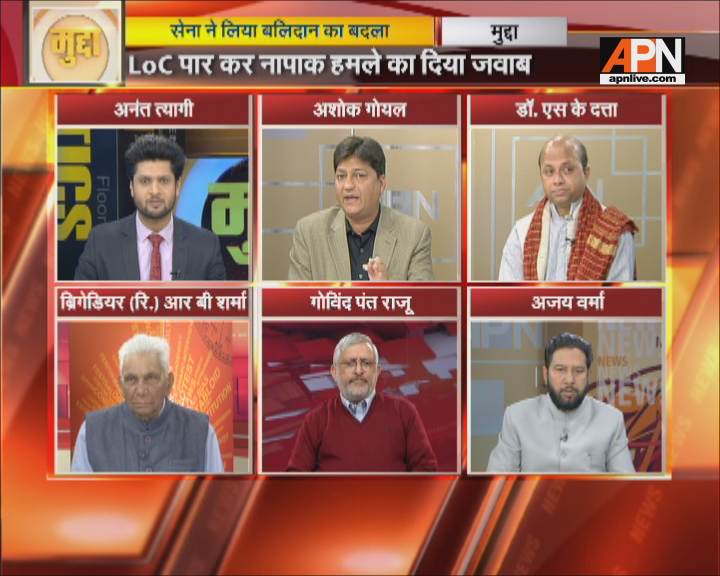Mudda panellists feel that India has handled the Pakistan action at LoC well and says the Modi government has been performing commendably on this front
Pakistan got the taste of its own medicine as Indian army troops crossed the LoC and killed three Pakistani soldiers. The Indian army had lost four of its army personnel in a cross-border fire a day earlier. At APN’s popular debate Mudda, anchorperson Anant Tyagi conducted the debate with panellists Ajay Verma of the Congress, Ashok Goyal of the BJP, retired brigadier RB Sharma, defence expert, Dr SK Dutta, foreign affairs expert, and Govind Pant Raju, consultant, APN.
Brig Sharma said that this effort was at the unit level and could not be called a “surgical strike”. He said that within 48 hours, the Army crossed the LoC and killed Pakistani soldiers. The number of those killed could be more than three. “It is good that with the government’s backing, the Army can go ahead and deal with Pakistan both at the local level and at the bigger level,” he said.
Dr Dutta said that Pakistan will not improve. He said that one cannot change one’s neighbor and we should realise our neighbor is a brute. Pakistan history shows that its policies are India-centric. However, he added, that more policies are needed at the diplomatic and the political level to deal with Pakistan.
Raju said that it’s obvious that the clearance to the army must have come from the centre. The army never acts on its own. Though this is not a surgical strike, the move is reflective of the government thinking that it will not go easy vis-à-vis Pakistan.
Ajay Verma wanted to know why the government always offers a reactionary approach. He said that such an approach is at the cost of our own people. He added that a stronger international policy is needed. He said that the government must be having intelligence before Pakistan’s attack. He said that the government’s approach should be pro-active and not retaliatory.
Goyal said that the under Modi, the army has been reacting well. He gave the example of the Doklam issue and mentioned that the army had managed to neutralise over 2,000 terrorists in the Valley. He said that under the Congress’ rule, the army was not so quick in its response.
Dr Dutta said that the Panchsheel doctrine is still being followed, and it’s not fine to go against such policies, so the Modi government’s approach has been commendable.
Brig Sharma said that one cannot see the situation in J&K as “normal circumstances”. There are international conventions that come in the way of an aggressive, pro-active, approach, which is why India is respected in international circles while Pakistan’s association with terrorist organisations is condemned.
Raju added that India would have been isolated internationally had it behaved like Pakistan. He said that the government needs to deal with the situation both at the ground and at the political level. Ajay Verma asked why the government can’t alter its defence policies when dealing with an enemy neighbor.
Brig Sharma said that Army confidence has actually gone up with the government’s latest efforts and the directive are very clear on how to deal with the enemy. Verma said that during the Congress’ time, army casualties were far less.
Goyal insisted that with the present government’s policies bearing fruit, India is being viewed as a “hard state” and not a “soft state”.
Dr Dutta added that, since 2014, Pakistan has been handled well, and now even China has had to accept that Pakistan is an international threat. “The change at the international level is because India has been able to bring the world spotlight onto the Pakistan menace,” he said.
-Compiled by Niti Singh Bhandari


 Latest world news14 hours ago
Latest world news14 hours ago
 Latest world news14 hours ago
Latest world news14 hours ago
 Latest world news13 hours ago
Latest world news13 hours ago
 India News14 hours ago
India News14 hours ago
 India News5 hours ago
India News5 hours ago
 Latest world news4 hours ago
Latest world news4 hours ago















